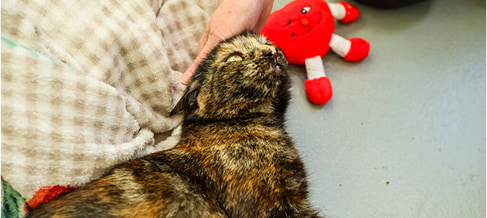The history of woman in animal welfare
Women have been at the forefront of the animal welfare movement since its inception, 200 years ago when the RSPCA was founded. In our history, we have some colossal female visionaries who have played a critical part in changing the lives of billions of animals globally. Angela Burdett-Coutts became president of the Ladies Committee of the RSPCA in 1870, spearheading vital education work to transform people’s attitudes to animals.
Ada Cole, who later went on to found World Horse Welfare, went undercover in Belgium in 1914 to track and expose the cruelty and suffering in the live transport of horses, sparking a 100-year battle to end these gruelling journeys. The live export ban that we are so eagerly anticipating in the weeks ahead is built on the shoulders of women like Ada.
And others, more recently, the indomitable Joyce D’Silva who has played such a key role in transforming the lives of farm animals, and Leah Garces who leads Mercy for Animals in the United States. But, despite this proud history, gender is a complicated issue when it comes to animal welfare. Like other sectors, such as care and education, there is the sense that we have been permitted this sphere of influence, precisely because it is seen as a ‘soft’, ‘nurturing’ profession. And this has led to a stark gender imbalance. As we see in dementia, disability or cancer charities, the frontline, delivering that essential, sharp-end care, is overwhelmingly female.
68 percent of the RSPCA’s frontline animal rescue teams are now women
The RSPCA’s context
Women who need the stamina and physical strength to hold and calm an injured deer long enough to rescue them from barbed wire, to contain and treat frightened horses or seals, to rescue dogs who have been so badly abused, their trauma has left them fearful of human touch. Our care teams who rebuild the lives and confidence of animals traumatised by abuse or neglect, the vets who need the emotional and mental resilience to deliver vital care and make difficult, life-changing decisions. This work is hard: how this role can be seen as soft or ‘women’s work’ is beyond me.
But there is another issue: it is often the lower-paid roles where women dominate, just as they do across other charities that deliver frontline services. Yet at the other end of the spectrum, animal welfare charities are still run, on the whole, by men. The chief executives of the major animal welfare charities in this country are overwhelmingly men - often amazing men who have achieved fantastic things for animals - but disproportionately represented all the same. Our own Chief Executive, Chris Sherwood has overcome his own challenges to rise to his position, as an openly gay man with a disability and a difficult working-class background. But there is a real issue when the majority of people on whom these charity movements are built are not visibly represented at the very top. And this imbalance remains despite efforts to make charities more inclusive and great places to work - for example at the RSPCA we are a real living wage employer, we have reshaped our benefits so they work for people from all backgrounds, we’ve rethought our leadership development programmes, invested in family-friendly working, and we’re sector leaders with our hybrid working policy.
There are, of course, some notable exceptions. The RSPCA has a long history of female chairs. And our new chair, Claire Horton CBE, when at Battersea, took this iconic and much-loved charity through a fundamental change which has seen it transform and thrive. Marianne Steele at The Donkey Sanctuary, Linda Edwards at SPANA, and Kirsteen Campbell at the Scottish SPCA are leading figures in the movement. But even here, with these fantastic examples, there seems to be a divide within the sector; those leading the conversation who get traction to lead debates such as the mighty David Attenborough, are normally men. And in the ‘grittier’ world of campaigning - those at the coal face, the Chris Packhams of this world, again tend to be male.
Lorem ipsum dolor sit amet consectetur lit magna pretium sed eu volutpat Lorem ipsum dolor sit amet consectetur lit magna pretium sed eu volutpat.

Despite challenges, things are moving in the right direction
The RSPCA is proud to be one of the largest and most well-known animal welfare charities in the world, with over 60% of its executive leadership team made up of women. The organisation is led by a chief executive and a senior team who are deeply committed to equity, diversity and inclusion (EDI).
The RSPCA recognises that issues of inequality are inherently intersectional. While gender inequality must be tackled, it cannot be addressed in isolation from issues of race and class. For instance, white, middle-class women within the sector may face challenges related to gender, but often experience fewer barriers compared to women of colour or those from working-class backgrounds. As a sector that is predominantly female, but also overwhelmingly white and middle-class, the RSPCA acknowledges the need to reflect critically on its own structures and culture.
Colleagues within the RSPCA have shared experiences that highlight unique forms of exclusion—particularly for Black men, who remain the most under-represented demographic in the animal welfare sector. Traditional theories of male hegemony often fail to account for their experiences, which can lead to a sense of exclusion and disengagement.
To address these disparities, the RSPCA recognises the importance of creating more opportunities for women working on the frontline to progress and develop. These individuals bring exceptional expertise and lived experience that should be nurtured and supported into leadership. The organisation is exploring innovative approaches such as mentoring, peer support, and affinity groups to help foster development and empowerment. Crucially, the RSPCA understands that support must continue after women step into leadership roles—it cannot stop at promotion.
At the same time, the organisation is committed to challenging harmful and false assumptions about different communities' relationships with animals. Creating a more inclusive sector means embracing the diverse experiences and perspectives that people from all backgrounds bring to animal welfare.
While International Women’s Day is a time to celebrate the achievements of women, the RSPCA also sees it as an opportunity to highlight another issue: the under-representation of men, particularly in frontline animal welfare roles. Encouraging greater gender diversity across all roles—including bringing more men into the sector—is an essential part of building a truly inclusive and effective movement for animals.

